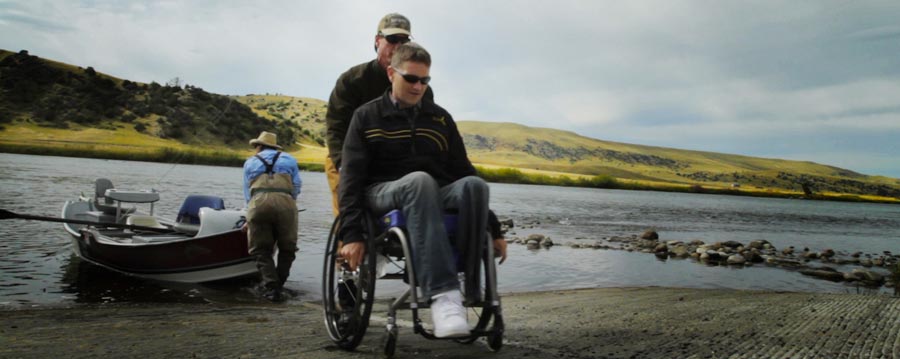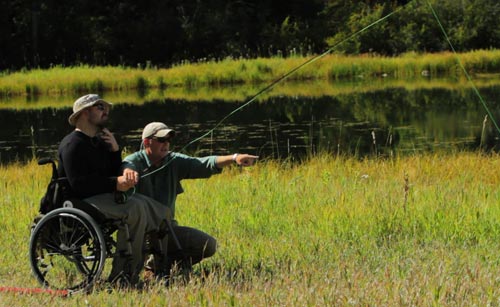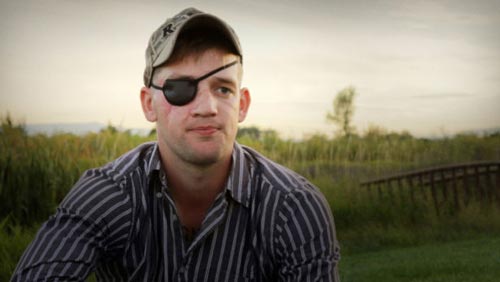NOT YET BEGUN TO FIGHT

The therapy of catch and release
Release Date: 2012
by Omer M. Mozaffar
(Feb 6, 2012)
Marine Colonel Eric Hastings, a quiet man of wide smile and thin hair, stands knee-deep in a whispering river, several decades and thousands of miles removed from the brutal chaos of the Vietnam war. As head of the group “Warriors and Quiet Waters,” he now brings damaged young veterans of more recent conflicts to his Montana ranch in hopes that the tranquility of fly-fishing will help relieve their stress disorders. In this touching documentary, the wounds of the past are soothed by flowing waters.

These are men of broken body. Until the camera moves, we would not know, because they seem frank and reflective, with no indication of damage. But, almost every participant is missing an eye, or leg, or more. Then, as they speak, we notice some awkwardness in their conversation. Some remember the blasts that shattered them. Others remember their hospital beds. One paraplegic warrior, in a deadpan tone, narrates a list of his injuries, seen in jump-cuts. A Navy Seal with steel eyes speaks through his iPad's computer voice, typing long sentences with one finger. When he plays his message, he remains in a posture of meditation for long moments after his text runs out. As he silently struggles through frustrating rounds of rehabilitation, learning to walk with a prosthetic leg, we wonder how many stories his frozen expression hides. But he finds light in the support of his wife of seven months.
There are, however, others whose afflictions are hidden from us. A reserved man in sunglasses and collared shirt looks like a forty-year-old employee of the ranch. But, he is only 28, former bomb technician who lived on adrenaline. When his trainer apologizes for touching him, we anticipate some serious revelations about his deep wounds. He compares his six-year Post-Traumatic Stress Disorder to a leech that slowly crept up on him until it started biting. Now he keeps his distance from people, trying not to recall the vile, disgusting violence he associates with all humanity. At the ranch, he accepts that there are people in the world who do care for veterans like himself. Soon, he is able to accept their hugs. These are men of broken soul.

The hope of Quiet Waters is that the patient, careful fly-fishing repetitions will teach the vets new, healthy behaviors, dissolving away harmful old habits. But Colonel Hastings does not let them hang on to their conquests: When a soldier catches a fish, he can celebrate, but he has to return the creature to its waters. The point is, these fighters know bloodshed too well; now Hastings teaches them to value life itself. The quiet Montana sky, lush forests, and distant mountains also help. Nevertheless, those grins from catching fish are captivating and priceless.
Movies often tell us about the camaraderie of soldiers. Here, despite their wounds, some of these soldiers long to return to service. One wounded warrior in eye-patch believes he is perfectly designed for deployment. He longs to return to Afghanistan. Another soldier feels himself responsible for his unit members' deaths. Hastings explains that a person will not ever get past those feelings, and must learn to live despite them. And go fly-fishing. Perhaps fly-fishing gained most prominence in Robert Redford's “A River Runs Through It.” While “Not Yet Begun to Fight” might lack the beautiful cinematography of that film, it still manages to capture the serene terrain above and below water. In Redford's film, the main character felt constrained by the forced precision of the process. Here, though, the goal is freedom from a deep prison.
Running only an hour, this documentary is as emotionally heavy as almost anything twice as long. Watching the soldiers in life beyond the group, we feel joy learning of some of their successes, along with the pains of their disappointments. As we watch Colonel Hastings, we cannot help but feel for him. His eyes well as he sympathizes with these young men. Occasionally, he sheds tears of gratitude watching them accomplish their small, but meaningful victories. With the grace of a cellist, he swings his own fishing pole back and forth. He soon catches a fish with his bare hands, caresses its body and tail, and lets it swim away.
Ultraviolet Projects and Story Road Films presents a film by Sabrina Lee and Shasta Grenier. Running time 60 minutes. No MPAA Rating (Language).





